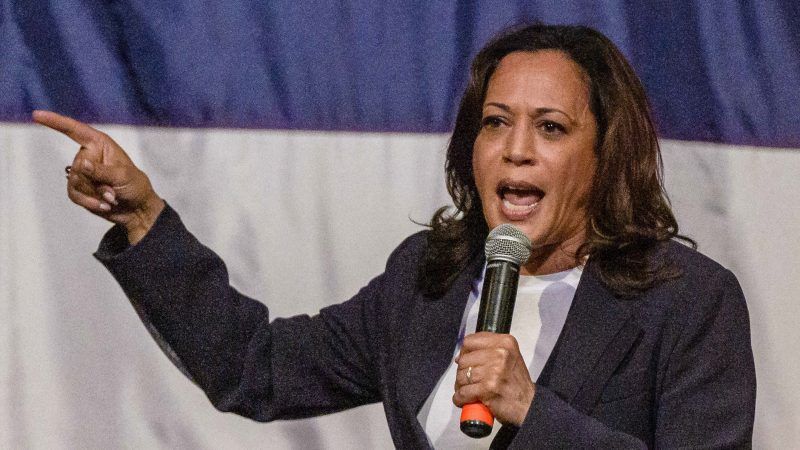Once Again, Kamala Harris' Record as a Prosecutor Was Less Than Progressive
There is no need to excuse Kamala Harris' law enforcement record just because it has outlived its usefulness for her political ambitions.

Joe Biden announced Sen. Kamala Harris (D–Calif.) will be his nominee for vice president, and so it appears we are once again litigating Harris' record as a prosecutor.
Harris's law enforcement career—first a line prosecutor, then San Francisco District Attorney, and finally California Attorney General—became a sore spot for her in the Democratic primary. The party had moved left on criminal justice, which took the sheen off her law enforcement bona fides.
In response to that shift, Harris has attempted to paint herself as a progressive prosecutor. Nevertheless, the pejorative refrain from the left flank of the Democratic Party has been "Kamala is a cop." In the wake of Biden's announcement, Democrats and pundits are now trying to help her buff out the rough spots:
.@KamalaHarris has spent her career advocating for innovation and reform in the criminal justice system, and fought for families by taking on big banks and for-profit colleges. On day one, she's ready to make the federal government work for the American people.
— The Democrats (@TheDemocrats) August 12, 2020
In a piece headlined "Kamala Harris Did What She Had To," The Atlantic's Peter Beinart wrote that Harris' deference to police and prosecutors was necessary for her political survival, which is not exactly a sterling endorsement of Harris, law enforcement, or politics.
More convincingly, San Francisco deputy public defender Niki Solis* writes in USA Today that Harris was indeed a progressive district attorney, citing Harris' practice of not charging low-level marijuana cases, her creation of a diversion program for juvenile offenders, and her refusal to pursue the death penalty, even in the case of a murdered police officer.
"Simply put, Harris was the most progressive prosecutor in the state," Solis writes. "This is not an anecdotal opinion. It is based on facts."
It is true that Harris pursued diversion programs and other progressive issues as San Francisco D.A. (It's also true that the San Francisco D.A. is probably the most progressive in the state as a general rule. Harris actually ran as a law-and-order candidate in 2003 against the incumbent lefty D.A.)
Solis didn't mention what happened after that death penalty case, though. The backlash nearly cost Harris her shot at becoming the California Attorney General in 2011 after police unions didn't endorse her. After Harris squeaked into office by one percentage point, she tacked toward the center and never lost the police unions again. As attorney general, she defended the California death penalty and opposed efforts to increase oversight of fatal police shootings.
As Beinart wrote, Harris did what she had to do to survive politically. It would be one thing if Harris said that working within the system required her to moderate herself, or that her views have shifted since her days as A.G., but instead, she insists her career in law enforcement was progressive. Whenever Harris is pressed about specific instances where she was decidedly unprogressive, she dodges, misleads, or glosses over the facts.
In her memoir, The Truths We Hold, Harris explicitly acknowledged the immense power of prosecutors in the criminal justice system.
"America has a deep and dark history of people using the power of the prosecutor as an instrument of injustice," Harris wrote in the book. "I know this history well—of innocent men framed, of charges brought against people of color without sufficient evidence, of prosecutors hiding information that would exonerate defendants, of the disproportionate application of the law."
Yet Harris avoids addressing why her office did things like defend egregious prosecutorial misconduct, fight exonerations, oppose civil asset forfeiture reforms, or appeal the removal of the entire Orange County district attorney's office from a high-profile death penalty case after a bombshell report revealed an unconstitutional jailhouse snitch program.
Harris office' launched an investigation into the Orange County D.A. scandal in 2015. The investigation ended four years later, after she had moved on to the U.S. Senate, with no charges against the sheriff's deputies involved, despite a California Superior Court judge ruling that two deputies "intentionally lied or willfully withheld material evidence." The Los Angeles Times reported in January that the California Attorney General's office only interviewed a handful of sheriff's deputies, none of whom were the ones at issue, and that the investigation had been moribund since 2017.
In 2010, while Harris was still San Francisco D.A., a California superior court judge slammed her office for failing to notify defense lawyers of known misconduct by a drug lab technician that later led the San Francisco police to shut down an entire section of the lab. The judge noted "a level of indifference" from prosecutors, who were aware "at the highest levels of the district attorney's office" of the problems.
In fairness, Harris may have been unaware of some of the cases her office was involved in—the California Attorney General's Office employs more than 1,100 attorneys—and state attorneys general most often reflexively defend prosecutors and the state's position. But if that's the case, it still doesn't sound like an official who was terribly concerned about the dark history of prosecutorial misconduct and wrongful convictions.
Harris has a solid record to tout in the Senate, where she is notably progressive and one of the most vocal advocates for criminal justice reform. But there is no need to excuse or whitewash Harris' law enforcement career just because it has outlived its usefulness for her political ambitions.
*CORRECTION: A previous version of this article referred to Niki Solis as a former public defender.


Show Comments (90)